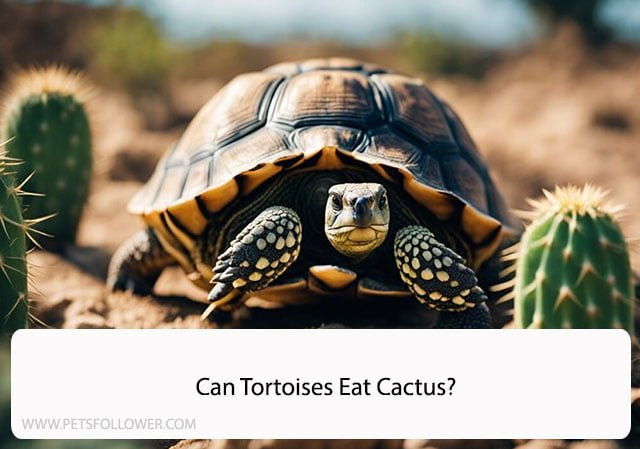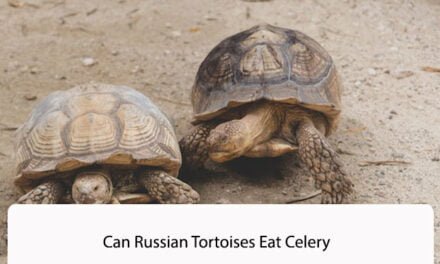Tortoises are known for their herbivorous diet, but can they eat cactus? As tortoise owners, it’s important to know what foods are safe for our pets to consume. While cactus may seem like a prickly and unappetizing food, it’s actually a common food source for some tortoise species.
First, it’s important to note that not all tortoise species can safely consume cactus. Some tortoises, such as the Russian tortoise, have a more herbivorous diet and may not be able to digest cactus properly. However, other tortoise species, such as the desert tortoise, have adapted to eating cactus as a primary food source.
Cactus can provide a variety of nutrients for tortoises, including fiber, calcium, and vitamins. However, it’s important to prepare the cactus properly before feeding it to your tortoise. The spines and prickly exterior of the cactus must be removed, and the remaining flesh should be cut into small, bite-sized pieces. Additionally, it’s important to only feed cactus in moderation, as too much can lead to digestive issues.
Tortoise Dietary Habits

Tortoises are herbivores, which means they eat only plant-based foods. Their diet usually consists of grasses, weeds, and other leafy greens. They have a slow metabolism, and their digestive system is adapted to break down tough plant materials.
It is important to note that not all plants are safe for tortoises to eat. Some plants can be toxic and cause health problems. Therefore, it is essential to research and ensure that the plants you feed your tortoise are safe for them.
Cactus is a type of plant that is commonly found in arid regions. While some species of cactus are safe for tortoises to eat, others can be harmful. It is important to identify the type of cactus before feeding it to your tortoise.
In general, it is recommended to feed tortoises a varied diet that includes a mix of different plant-based foods. This ensures that they receive all the necessary nutrients they need to stay healthy.
Understanding Cacti
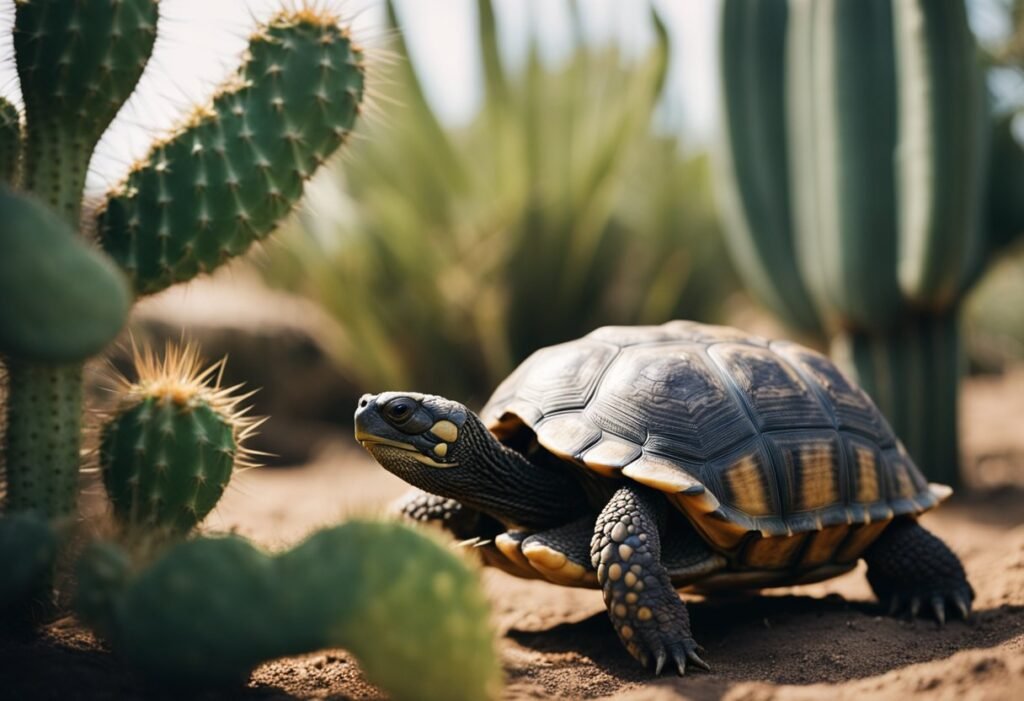
Cacti are a group of succulent plants that are native to the Americas. They are known for their unique appearance, with thick stems that are covered in spines and often adorned with brightly colored flowers. Cacti are well adapted to arid environments, and are able to store water in their stems and leaves to survive long periods of drought.
Cacti come in many different shapes and sizes, from small, round cacti that can fit in the palm of your hand to towering saguaro cacti that can reach heights of up to 40 feet. Some cacti have long, thin stems that can grow to be several feet long, while others have short, stubby stems that barely rise above the ground.
Despite their prickly appearance, cacti are a valuable source of food and water for many animals, including tortoises. In fact, some tortoise species have evolved to specialize in eating cacti, and have developed specialized digestive systems that allow them to break down the tough, fibrous plant material.
However, not all cacti are suitable for tortoises to eat. Some species contain toxic compounds that can cause illness or even death in tortoises and other animals. It is important to research which cacti are safe for tortoises to eat before offering them as a food source.
Nutritional Value of Cacti
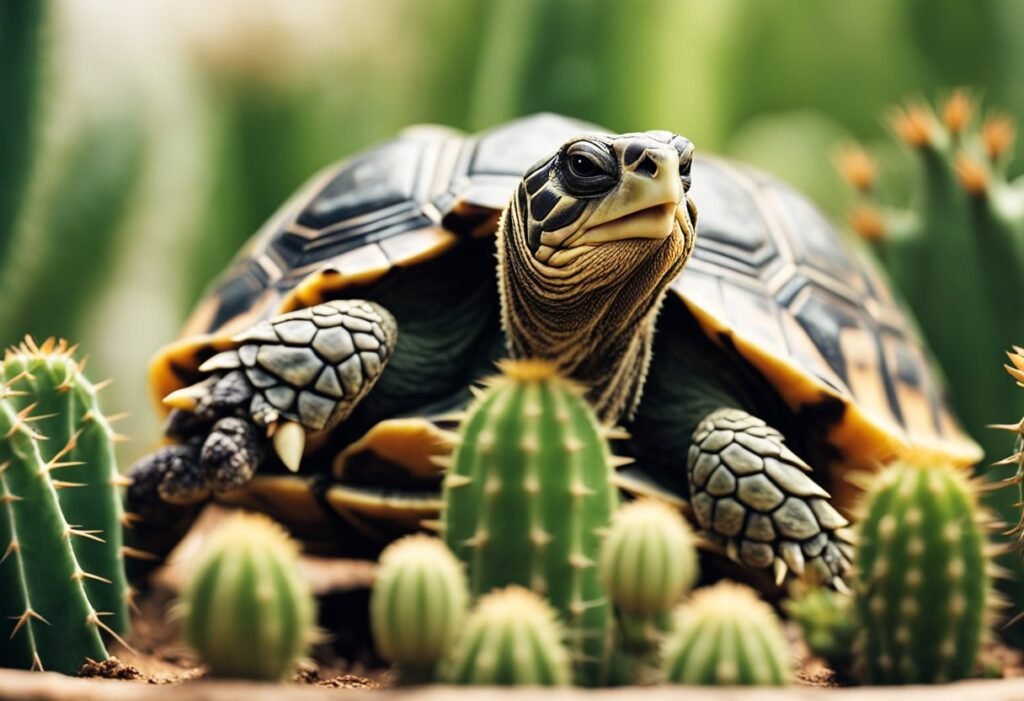
Cacti are a great source of nutrition for many animals, including tortoises. They are rich in water, fiber, and various nutrients. Here are some of the nutritional benefits of cacti:
- Water: Cacti are made up of mostly water, which is essential for keeping tortoises hydrated. In fact, some species of cacti can contain up to 90% water.
- Fiber: Cacti are also a great source of fiber, which is important for maintaining a healthy digestive system in tortoises. Fiber helps to keep the digestive tract moving and can prevent constipation.
- Vitamins and minerals: Cacti contain a variety of vitamins and minerals, including vitamin C, vitamin E, calcium, and potassium. These nutrients are important for overall health and can help to prevent disease.
- Low in fat: Cacti are naturally low in fat, which makes them a great food choice for tortoises who need to maintain a healthy weight.
Overall, cacti are a nutritious food source for tortoises. However, it is important to note that not all species of cacti are safe for tortoises to eat. Some species contain toxins that can be harmful to tortoises, so it is important to do your research and only offer safe species of cacti to your pet.
Cacti in a Tortoise’s Diet
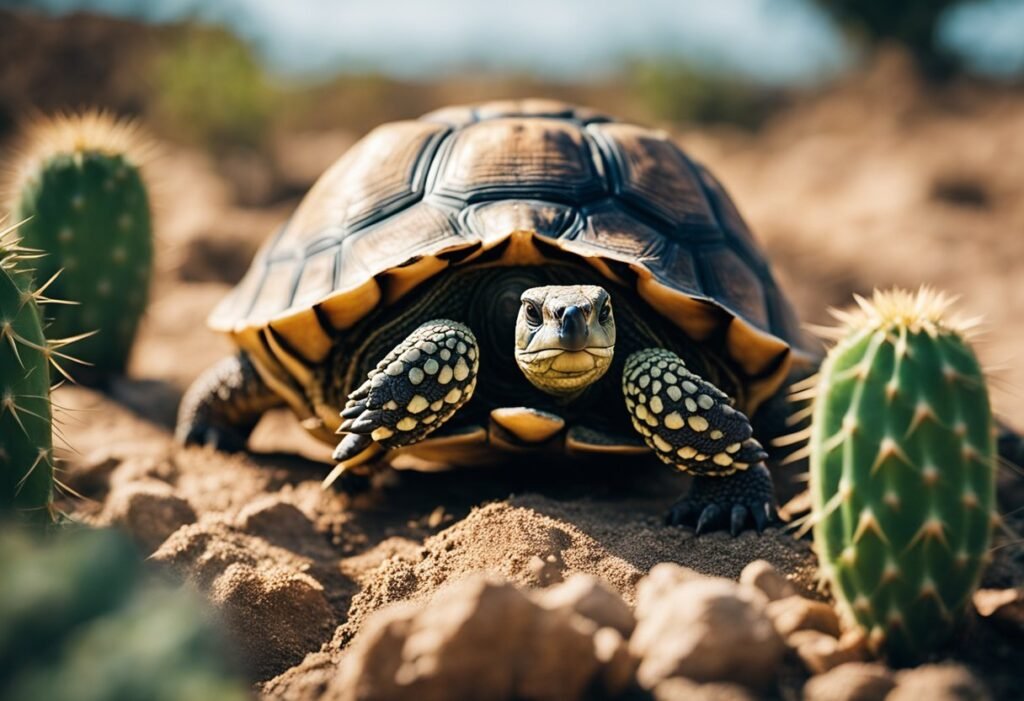
When it comes to feeding tortoises, there are a variety of foods that can be included in their diet. One of the foods that is often considered is cactus. While cactus may not be a traditional food source for tortoises, it can be a healthy addition to their diet when given in moderation.
Benefits
Cactus is a low-fat food that is high in fiber, vitamins, and minerals. It is also high in water content, which can help keep tortoises hydrated. The prickly pear cactus, in particular, is a good source of calcium and potassium, which are important for the development and maintenance of healthy bones.
Risks
While cactus can be a healthy addition to a tortoise’s diet, there are some risks that should be considered. First, not all types of cactus are safe for tortoises to eat. Some cacti are toxic and can cause serious health problems if ingested. It is important to research the specific type of cactus before feeding it to your tortoise.
Second, cactus spines can be dangerous for tortoises to consume. The spines can cause blockages in the digestive tract, which can lead to serious health problems. If you decide to feed your tortoise cactus, be sure to remove all of the spines before giving it to them.
In conclusion, cactus can be a healthy addition to a tortoise’s diet when given in moderation and with caution. It is important to research the specific type of cactus and remove all spines before feeding it to your tortoise.
Preparation of Cacti for Tortoises

When feeding cacti to tortoises, it is important to prepare the cacti properly to ensure the safety of the tortoise. Here are some steps to follow when preparing cacti for tortoises:
- Choose the right type of cactus: Not all cacti are safe for tortoises to eat. It is important to choose a cactus that is safe for your tortoise. The best cacti for tortoises are the Opuntia species, also known as prickly pear cactus.
- Remove the spines: Cacti have sharp spines that can cause harm to your tortoise’s mouth and digestive tract. Use a pair of tongs or gloves to remove the spines before feeding the cactus to your tortoise.
- Wash the cactus: Rinse the cactus thoroughly with water to remove any dirt or debris. This will ensure that your tortoise is not consuming any harmful substances.
- Cut the cactus into small pieces: Cut the cactus into small, bite-sized pieces. This will make it easier for your tortoise to eat and digest the cactus.
- Offer the cactus as a treat: Cactus should not be the main source of food for your tortoise. Offer it as a treat in moderation, along with a balanced diet of vegetables and fruits.
By following these steps, you can safely prepare cacti for your tortoise to enjoy as a treat.
Alternatives to Cacti in a Tortoise’s Diet
While cacti are a great source of hydration and nutrients for tortoises, they are not the only option available. In fact, there are several alternatives that can provide similar benefits to your pet.
One alternative is leafy greens, such as kale, collard greens, and dandelion greens. These are high in fiber and vitamins, and can help keep your tortoise’s digestive system healthy. Another option is vegetables, such as carrots, squash, and sweet potatoes. These are also high in vitamins and can provide a good source of hydration.
Fruits can also be added to your tortoise’s diet. However, it is important to remember that fruits should only be given in moderation due to their high sugar content. Good options include berries, melons, and apples.
In addition to these options, there are also commercial tortoise diets available. These are formulated specifically for tortoises and can provide a balanced diet. However, it is important to read the ingredients and ensure that they do not contain any harmful additives or preservatives.
Overall, while cacti can be a great addition to your tortoise’s diet, there are several alternatives available that can provide similar benefits. It is important to provide a varied diet and ensure that your tortoise is receiving all the necessary nutrients for optimal health.
Frequently Asked Questions
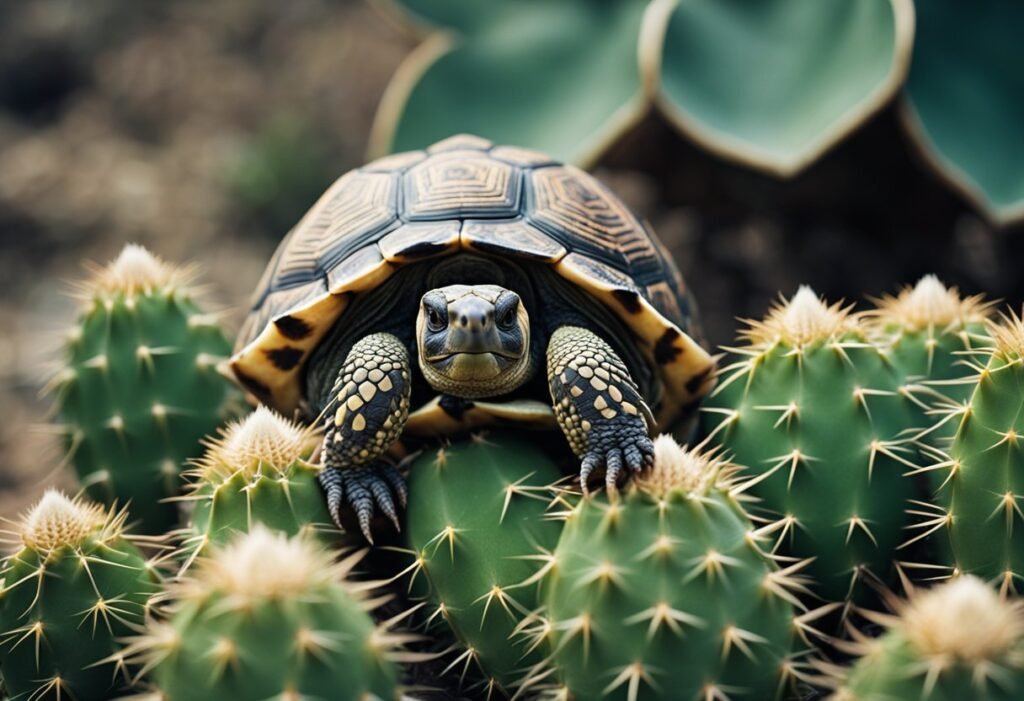
Are cactus pads a good food source for tortoises?
Cactus pads can be a good addition to a tortoise’s diet, but they should not be the sole source of food. Cactus pads are high in fiber and low in protein, which makes them a good source of roughage for tortoises.
What types of cactus are safe for tortoises to eat?
Not all cactus species are safe for tortoises to eat. The Opuntia species, commonly known as prickly pear cactus, is safe for tortoises to eat. Other species, such as the Saguaro cactus, should be avoided.
How often can tortoises eat cactus?
Cactus should be fed to tortoises in moderation. A good rule of thumb is to feed cactus pads once or twice a week, depending on the size of the tortoise.
What are the benefits of feeding tortoises cactus?
Cactus pads are a good source of fiber and can help promote healthy digestion in tortoises. They also contain vitamins and minerals, such as vitamin C and calcium, which are important for overall health.
Can cactus be harmful to tortoises?
Some cactus species, such as the Saguaro cactus, can be harmful to tortoises if ingested. These cacti contain toxins that can cause digestive problems and even death in some cases. It is important to only feed tortoises safe species of cactus, such as the Opuntia species.
What other types of plants should be included in a tortoise’s diet besides cactus?
Tortoises should have a varied diet that includes a mix of grasses, weeds, and leafy greens. Some good options include dandelion greens, collard greens, and kale. It is important to research which plants are safe for tortoises to eat and to vary their diet to ensure they are getting all the necessary nutrients.

